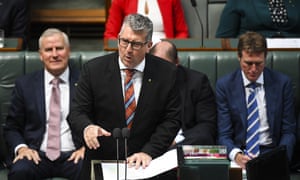Nationals MP also calls for expansion of Australia’s coal seam gas industry
The new minister for resources, Keith Pitt, says he sees no case to
increase the level of taxation on the booming gas industry, despite
concerns from experts that large multinationals are avoiding paying tax,
and the budget is missing out on valuable revenue.
The Queensland National, who replaced Matt Canavan in the portfolio after Canavan resigned to back Barnaby Joyce’s unsuccessful tilt at the party leadership, told Guardian Australia: “I think the taxation levels are reasonable where they are, and it will be steady as she goes.”
Pitt acknowledged there were calls to overhaul the tax regime, with concerns Australians are not being properly compensated for the extraction of the country’s abundant natural resources, but he said “there are also expert views around saying we should increase the GST, or change a whole pile of other policies, but that’s not the government’s position”.
The new resources minister also called for:The Queensland National, who replaced Matt Canavan in the portfolio after Canavan resigned to back Barnaby Joyce’s unsuccessful tilt at the party leadership, told Guardian Australia: “I think the taxation levels are reasonable where they are, and it will be steady as she goes.”
Pitt acknowledged there were calls to overhaul the tax regime, with concerns Australians are not being properly compensated for the extraction of the country’s abundant natural resources, but he said “there are also expert views around saying we should increase the GST, or change a whole pile of other policies, but that’s not the government’s position”.
- An expansion of Australia’s controversial coal seam gas industry, including the contentious Santos project in north-west New South Wales, arguing the industry had worked to fix problems and “the technology is proven”. “I think we should open up Narrabri and others,” Pitt said. “If we can drive down domestic gas prices, everyone’s lives are made easier, particularly business.”
- More exploration of carbon capture and storage, even though CCS has not been commercially viable despite years of development. Pitt said there were “real opportunities” with the technology that could be combined with ultra super critical coal plants to reduce emissions. He said he was firmly technology-neutral when it came to power generation, but “coal will continue to be an important part of not only the economy, but what happens in regional areas for a long time to come”.
Scott Morrison has left open the option of his government indemnifying the plant from future carbon risk, and politically connected power baron Trevor St Baker told Guardian Australia no project at that scale could proceed without an indemnity from the commonwealth.
But Pitt said those were issues for his colleague, the energy minister, Angus Taylor, and he said he would not be in a position to have an informed view about whether or not Collinsville stacked up until the feasibility study was completed.
“That’s why we are doing the study,” he said. “I can’t assess the feasibility of the project until that is completed.”
Pitt has previously advocated consideration of nuclear power in Australia, but declined to repeat that view now he was in the resources portfolio. He said it would be up to Taylor if nuclear proceeded in Australia, and he said it would certainly not proceed unless there was bipartisan support.
He said he accepted the science of climate change, but declined to express a view about whether global heating was fuelled by human activity. Pitt said there was “no doubt” the climate was changing, but the focus now should be on building resilience, and on technological solutions to lowering emissions.
Pitt said he has never held the view that “we should be pouring unrestricted amounts of all sorts of bits and pieces, not just CO2 or greenhouse gases, into the atmosphere”.
Pitt’s comments came as Australia’s chief scientist, Alan Finkel, told the National Press Club Australia’s energy sector was already well on the way with the transition to low emissions energy.
But he said while renewable technologies were “being scaled up, we need an energy companion today that can react rapidly to changes in solar and wind output”.
Finkel said Morrison had nominated gas as the transitional fuel “in the short term”. But he declared the “hero” of the transition would be hydrogen.
In parliament, Taylor said the government was committed to rolling out bilateral agreements with the states to guide the energy transition, like the $2bn deal unveiled recently with New South Wales that Canberra says will boost gas supply.
But he said for that deal to be replicated, the states “must do the right thing”.
“When it comes to those deals, whether it’s NSW or Victoria, the principle is very simple,” Taylor said. “No gas, no cash.”

No comments:
Post a Comment